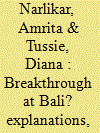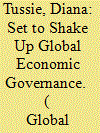| Srl | Item |
| 1 |
ID:
146453


|
|
|
|
|
| Summary/Abstract |
The World Trade Organization’s (WTO) Ministerial Conference at Bali in December 2013 seemed to have marked a landmark moment in the history of the negotiations of the Doha Development Agenda (DDA). This article begins with a brief analysis of why the DDA has been quagmired in deadlocks and become the longest running trade round in the history of the multilateral trading system. It then discusses the significance of what was achieved at the Bali Ministerial in light of repeated failures and particularly from the perspective of the world’s poorest countries. It explains why and how breakthroughs were achieved and highlights several important institutional innovations. Lastly, it discusses how sustainable these innovations might be.
|
|
|
|
|
|
|
|
|
|
|
|
|
|
|
|
| 2 |
ID:
087937


|
|
|
|
|
| Publication |
2009.
|
| Summary/Abstract |
The breakdown of the North-South, East-West governing principles, and the removal of superpower overlay have led to an increasingly decentralised system setting the stage for the so called new geography of trade and the reconfiguration of political - diplomatic strategies. Such strategies now include contestation, articulation, competitive liberalisation, ample inter-state coalition building such as the G-20, G-33, G-90 in the Doha Round and the proliferation of regional and wider ranging preferential arrangements. Regionalism is both policy and project. Agreements vary widely in motivation, form, coverage and content. It is very often the case that, as in multilateral institutions, one major actor sets the agenda at the regional level with the view not only of constructing and retaining power at that level but also of setting global precedents. New balancing or bandwagoning efforts vis-à-vis the local strong power are set in motion with fresh implications for the emerging global architecture. Regional alignments are thus constantly shaping and reshaping market relations. Intra-Latin American agreements (those not including the majors, the US and the EU) were motivated by the search for wider markets building up economies of scale amongst similar countries. Such agreements mostly focused on market liberalisation through diverse schedules of tariff reduction. The result has been the emergence of shallow regional agreements. Nonetheless, most have not been fully implemented, but they show a long term trend towards potential convergence, especially if the Community of South American Nations moves on. External pressures have also spurred agreements as defensive mechanisms. So we witness impulses to regionalism complementing and at times competing with older patterns and trends. This contribution focuses on the different avenues that Latin America is undertaking in terms of regional projects. It will assess the dynamics of intra- regional integration and the inter-action effects with varieties of North-South integration.
|
|
|
|
|
|
|
|
|
|
|
|
|
|
|
|
| 3 |
ID:
029154


|
|
|
|
|
| Publication |
Hampshire, Gower Publishing Company, 1983.
|
| Description |
xii, 238p.
|
| Standard Number |
0566005662
|
|
|
|
|
|
|
|
|
|
|
|
Copies: C:1/I:0,R:0,Q:0
Circulation
| Accession# | Call# | Current Location | Status | Policy | Location |
| 022892 | 337.8/LAT 022892 | Main | On Shelf | General | |
|
|
|
|
| 4 |
ID:
129020


|
|
|
|
|
| Publication |
2014.
|
| Summary/Abstract |
THE KEY INSIGHT EXPRESSED IN THE STRIKING WORDS OF THE BRUNDTLAND Commission-"The Earth is one but the world is not"1-remains as relevant a political statement about most global governance challenges today as it was about sustainable development twenty-seven years ago. Global governance entails multilevel and networked relations and interactions for managing and facilitating linkages across policy levels and domains. It consists of formal and informal arrangements that provide more order and stability for a world in constant and rapid flux than would occur naturally-the range of international cooperation without a world government. Intensifying global interdependence, growing recognition of problems that defy solutions by a single state or organization, and increasing numbers and importance of nonstate actors have all contributed to the growth of global governance as an analytical framework.
|
|
|
|
|
|
|
|
|
|
|
|
|
|
|
|
| 5 |
ID:
162015


|
|
|